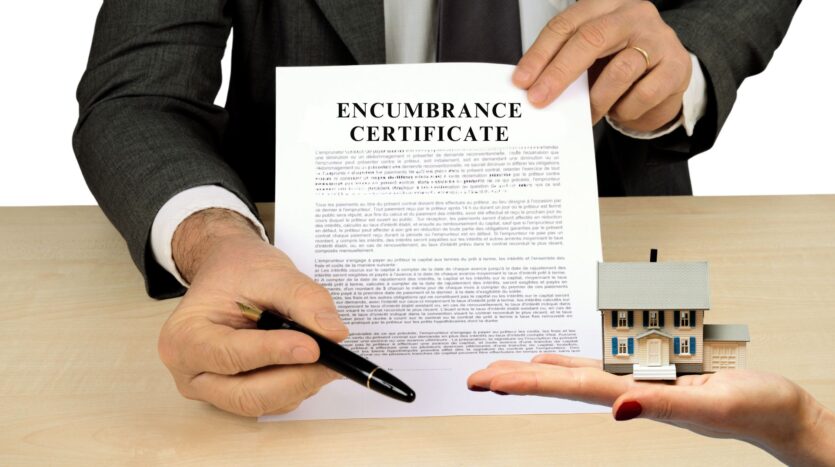What is an Encumbrance Certificate (EC)?
If you’re planning to buy a property, you’ve probably heard the term “Encumbrance Certificate or EC”. It might sound a bit technical, but don’t worry, it’s not as complicated as it seems. The EC is one of the most important documents you need to check before making any property deal.
Think of it like a background check for your future home, ensuring that the property is free from any financial or legal issues, like unpaid loans or disputes. Whether you’re buying, selling, or even applying for a home loan, having a clear EC is crucial. In this guide, we’ll explain everything you need to know about the Encumbrance Certificate, in simple terms. Let’s get started!
What is an Encumbrance Certificate?
An Encumbrance Certificate, often abbreviated as EC, is a legal document issued by the government that certifies whether a property is free from any financial or legal liabilities. It essentially serves as proof that the property has a clear title and isn’t tied up in any unpaid loans, mortgages, or legal issues.
The EC records any encumbrances or charges on the property over a specific period. If a property has been used as collateral for a loan or is under litigation, this will be reflected in the EC.
Why is an Encumbrance Certificate Important?
The EC is one of the most important documents required for buying or selling a property in India. Here’s why:
- Assurance of Clear Title: The EC provides peace of mind by assuring buyers that the property does not have any legal or financial liabilities attached to it.
- Legal Requirement: Banks and other financial institutions often ask for the EC when approving home loans. It helps them ensure that the property they are financing is legally clear.
- Property Sale: If you’re planning to sell your property, having an EC is crucial as it makes the transaction smoother by providing transparency to the buyer.
- Inheritance and Will Claims: The EC can also prove beneficial in settling inheritance claims. It helps establish the rightful ownership of a property when there are multiple claims.
Types of Encumbrance Certificates
There are two main types of ECs that you should know about:
1. Form 15 (Encumbered Certificate)
Form 15 is issued when there are any encumbrances (charges) on the property during a specified period. This could include mortgages, legal disputes, or other transactions that have created a lien on the property.
2. Form 16 (Nil Encumbrance Certificate)
Form 16 is issued when there are no encumbrances on the property during the specified period. This certificate is commonly referred to as a “Nil Encumbrance Certificate” and indicates that the property is free from any legal or financial charges.
Both forms are equally important, but obtaining Form 16 is more desirable for potential buyers and lenders as it signifies a clear property title.
Documents Required for an Encumbrance Certificate
To apply for an EC, you will need to submit certain documents. These may vary slightly depending on the state, but the basic requirements are as follows:
- Application Form: You need to fill out a specific form requesting the EC.
- Proof of Ownership: Provide documentation that proves your ownership of the property.
- Property Details: Include details such as survey number, property boundaries, and measurements.
- Address Proof: A copy of your address proof, such as Aadhaar card, passport, or voter ID.
- Power of Attorney (if applicable): If you are applying on behalf of someone else, you need to provide a Power of Attorney.
- Application Fees: There is a nominal fee that you need to pay to process the application.
How to Apply for an Encumbrance Certificate?
Applying for an EC is a fairly straightforward process, and you can do it either online or offline. Here’s a step-by-step guide for both methods:
1. Offline Application Process
- Visit the sub-registrar’s office where the property is registered.
- Submit the application form along with all the necessary documents.
- Pay the required fees, which vary from state to state.
- The authorities will verify the information and records of the property.
- The EC will be issued within 15-30 days, depending on the state’s processing time.
2. Online Application Process
Many states in India now offer an online facility to apply for an EC. Here’s how you can apply online:
- Visit your state’s official land registration website.
- Look for the section to apply for an EC.
- Fill in the required details such as property information, ownership, and time period for which the EC is needed.
- Upload the necessary documents and pay the fees online.
- Once the application is submitted, you can track its status online.
- The EC will be sent to your registered email or can be downloaded from the website once issued.
Processing Time and Fees
The time taken to issue an EC varies by state but typically ranges from 15 to 30 days. The application fees also differ depending on the state and the time period for which you’re requesting the EC.
For example, applying for an EC for a period of up to 30 years may have a higher fee compared to applying for a shorter duration. Always check the state-specific guidelines for the most accurate fee structure.
How to Check the Status of Your EC Application?
After submitting your application, you can easily check the status of your EC through the official website of your state’s registration department. Here’s how:
- Visit the land registration website.
- Navigate to the EC status page.
- Enter your application number or property details.
- You will be able to view the current status of your EC application.
If you have applied offline, you may need to visit the sub-registrar’s office or contact them to inquire about the status.
Validity of an Encumbrance Certificate
An EC is valid only for the period specified in the certificate. For example, if you apply for an EC for the period between 2000 to 2020, it will only certify that the property was free of encumbrances during that time. It does not guarantee the status of the property after 2020 unless a fresh EC is issued.
If you are buying a property, it is always recommended to get an updated EC to ensure that there are no recent encumbrances or legal issues.
Limitations of an Encumbrance Certificate
While the EC is a vital document, it does have some limitations:
- Excludes Unregistered Transactions: The EC only records registered transactions. If there are any unregistered encumbrances, such as informal loans or family disputes, these will not appear in the EC.
- Incomplete Legal Protection: The EC provides a reasonable level of assurance, but it is not a substitute for conducting a thorough legal review of the property documents.
- Limited Time Period: The EC is valid for the period you have requested it for. You would need to apply for a fresh EC to cover periods beyond that.
Importance of a Fresh EC
If you are planning to buy or sell a property, it is essential to have a fresh EC. Many buyers make the mistake of relying on old ECs, which may not reflect recent transactions. A fresh EC ensures that the property is legally clear and free from any financial liabilities as of the latest date.
How Often Should You Check the EC?
It’s recommended to check the EC every few years, especially if you plan to sell the property in the future. Regular checks ensure that no unauthorized loans or claims have been made against the property.
Conclusion
The Encumbrance Certificate is an essential document in property transactions, ensuring that a property is free from any financial or legal obligations. Whether you’re buying a home, selling one, or applying for a loan, understanding the importance of an EC can save you from future legal complications.
By obtaining a fresh EC before any major transaction, you protect yourself from potential risks and ensure a smooth and transparent property deal. Always consult with a legal expert to verify all documents before finalizing any property purchase or sale.
Frequently Asked Questions
What is an Encumbrance Certificate (EC) in real estate?
Why is an Encumbrance Certificate important for property buyers?
How can I apply for an Encumbrance Certificate online in India?
How long does it take to get an Encumbrance Certificate?
What documents are needed to apply for an Encumbrance Certificate?
Can I check the status of my Encumbrance Certificate application online?
What is the difference between a Form 15 and a Form 16 Encumbrance Certificate?
Is an Encumbrance Certificate required for a home loan in India?
How long is an Encumbrance Certificate valid?
What should I do if the Encumbrance Certificate shows encumbrances on the property?
Investing in real estate can come with various risks, from market fluctuations to property management challenges. At Hari Hara Properties, we ensure that all your property needs are fully taken care of, offering expert guidance and management. With us, you can invest with confidence, knowing that your real estate journey is backed by a team dedicated to minimizing risks and maximizing returns.

